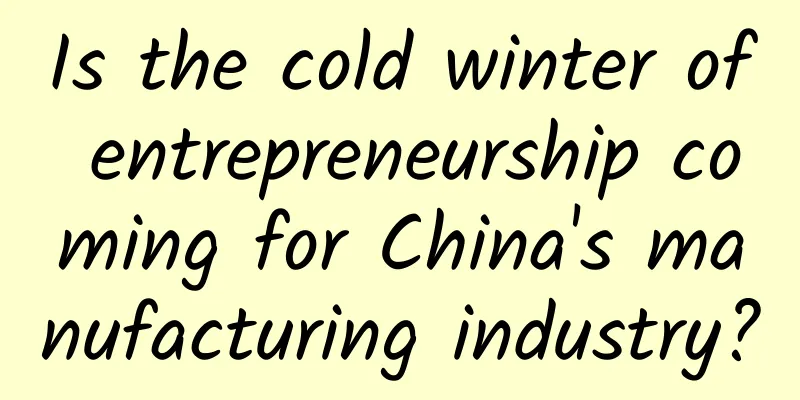|
There was almost no good news for the Chinese economy this week. First, the import and export data for July was very tragic. Exports fell 8.8% year-on-year in RMB terms, and imports fell 8.6% year-on-year. It should be noted that the expected value of exports was a decline of 1.5%, and this data is estimated to have shattered the glasses of the Statistics Bureau. Then came the news of various manufacturing exoduses, such as Chinese spinning mills leaving the United States and Foxconn leaving India. Of course, the reason is nothing more than the sharp rise in the cost of Chinese manufacturing. The cost of China's spinning industry is 30% higher than that of the United States. Foxconn's setting up factories in India is not only cheaper, but also does not have to "harm" the lives of Chinese people. However, there is still an industry that is still very prosperous, that is, the "entrepreneurship" industry. The so-called "entrepreneurship" industry is a capital game based on venture capital and aimed at burning money. But as a part of economic activities, can the technology industry be immune to the drastic fluctuations of the economy? Can the cage-changing and industrial upgrading really replicate the prosperity of the manufacturing industry in the past to the technology industry? Is Internet+ the universal key to restarting the Chinese economy? As an editor who works in the Internet industry, in this issue of Yiping, I would like to discuss with you whether the winter of the "entrepreneurship" industry is really coming.
China's manufacturing industry is leaving on a large scale
Domestic manufacturing companies have all started to implement the "going out" strategy, but this "going out" does not mean going out to acquire companies, but to set up factories overseas. On the one hand, this reflects the inevitable consequences of industrial upgrading, but also brings the hidden worries of industrial hollowing out. The most worrying thing is that the industry has not completed upgrading, and all manufacturing industries have gone out.
Chinese manufacturing companies have various choices for industrial transfer destinations. There is no other way because there are so many countries in the world with lower manufacturing costs than us. However, most of them choose India and Brazil. Those who cannot go abroad are basically facing the situation of closing down. In 2014, many factories in Dongguan and Suzhou were successively "industrial upgraded".
China's manufacturing costs are already close to those of the United States. According to a report by the Boston Consulting Group, in August 2014, China's manufacturing cost index was 96, with the US manufacturing cost as 100. This index is based on four criteria: wages, labor productivity, energy costs, and exchange rates. However, China's manufacturing wages are still about 1/7 of those in the United States, so it seems that China's manufacturing wages will have no hope of increasing in the future.
Of course, the biggest shake to people's confidence is the departure of Foxconn. This company, which has caused many "jumping off buildings" incidents in the Chinese people, has also solved a large number of employment problems in China. The government has given Foxconn so many policy benefits that if it were not for the fact that it was really unsustainable, it would probably not have thought of moving the factory. The $5 billion factory in India is probably just the vanguard of Foxconn's industrial transfer.
However, mainland enterprises are not so determined. TCL Group has already planned to build a factory in India in 2015 to manufacture mobile phones and TV products. There is no way. As a nation with a lot of advantages, their labor costs are lower than ours, and their market is favored by the whole world. The whole world is eyeing India's market potential. Chinese people can buy it, and in fact, India's wealthy class is not much behind. In addition, India's export tax is lower than China's, which can serve as a good export transit station, providing convenience for enterprises to explore the markets in South Asia, Africa and Europe. Finally, although India's curry-flavored English is difficult to understand, it still has inherent advantages. Just look at how many CEOs they have produced and you will know that Western companies still like it very much.
However, I still hope that Chinese fabric manufacturers will not all rush to the United States. After all, the economic struggle between China and the United States is in a white-hot stage. As Chinese companies, they should have some political awareness. "Deserting" to the United States is too damaging to morale.
"Coder" wages approach those of the United States
I believe that many readers of NetEase Technology are "code farmers". I was also a code farmer in the past, although we all felt that the little salary we got every month was not worth the abnormal working method of 996 (9 am to 9 pm, six days a week). However, judging from the data, the salary increase of technology industry practitioners is the most terrible among all industries. For foreign companies, China used to be a place full of cheap technology talents, otherwise global technology companies would not flock to establish R&D centers in China. But today this situation has completely changed. Just look at the bleak operation of foreign companies such as IBM, Cisco and Ericsson in China, and you will know that the skyrocketing cost of technology labor in China has made it difficult for foreign companies to cope with it.
This situation is more obvious in the first half of this year. With the advent of the Internet+ wave, various inexplicable startups driven by capital have sprung up like mushrooms after rain. Many of these companies may only have an idea to start a business. After getting the money, of course, they have to recruit workers vigorously to carry out business. As a result, programmers are in urgent need. Recently, the editor received a recruitment advertisement from a headhunter. The salary of junior programmers for iOS and Android has reached the level of 15K x 15 months per year, and only 1-3 years of experience are required. As for which Internet company, the editor is hard to say (I guess Yiyou has never heard of it). In addition, an old friend of the editor works in a foreign software company. Recently, a newcomer came to the company with less experience than the editor's friend and a monthly salary of 20K. After the editor's friend learned about the salary of the newcomer, he almost cursed. Because he has worked for so many years and the salary of the new employee is not as high as that of the new employee. In the end, when discussing the salary with the boss, he had a fight about it. In the end, the boss told him that he had no choice. If he didn't offer this price now, he would not be able to recruit anyone. However, the company has regulations on salary increases, and the editor's friend can't get the salary of the newcomer anyway. In the end, the boss even directly suggested that the editor's friend quit his job and change jobs.
Of course, the above is just a microcosm of the current salary increase in the technology industry. However, some data from 2015 show that the labor cost of China's technology industry is already close to that of Silicon Valley. The salary of intermediary management talents (presumably various product managers) is even higher than that of Silicon Valley. Considering the tax level, the labor cost of China's technology industry has already caused some headaches for foreign companies.
According to a report by PCI, a headhunting company, the employment costs of most technology companies in Beijing, Shanghai and Shenzhen are almost the same as those in Silicon Valley. The employment costs here refer to the expenditure costs of the enterprise, not the wages received by ordinary people like us. Although there is still a big gap between China and the United States at the level of junior engineers, the two sides are basically the same in senior management positions. The gap between the rich and the poor in China's technology industry is so obvious.
The cost of a junior engineer is about half of that in Silicon Valley, at roughly $50,000 per year. But this difference is basically bridged at the supervisor level (usually with more than a decade of experience). The report also cites some examples, Python engineers (1-3 years of work experience) have a basic monthly salary of at least 15K RMB in Beijing, and if they encounter well-funded Internet companies, such as Meituan, this salary must be added with stock options, additional cash or non-cash bonuses, or other benefits. Housing, food and transportation subsidies for middle-level managers can be as high as 30-35% of total cash income.
The current popularity of Lagou.com, which Premier Li Keqiang visited, shows how crazy the current capital and employee salaries are. However, if the economy slows down and capital cools down, and those pigs flying in the sky fall down, can we still have such a carnival?
The cold winter of the entrepreneurial industry is coming
In fact, the entrepreneurial environment of China's technology industry has always been developing healthily. However, since Alibaba went public (I don't know why it was at this time, probably because the capital went crazy after seeing the success of Alibaba's IPO), the whole environment has become very aggressive. After Premier Li Keqiang's Internet+ stimulant, he wanted the sky to be full of flying pigs. It even gave birth to the "entrepreneurship" industry, where the logic of defrauding investment, burning it, and defrauding investment again is always successful. After being scolded by the "No. 1 Internet Analyst" in China, Xu Dandan has now become an entrepreneurial expert and was even received by the Premier.
My college roommate is now the CEO of 36Kr. When we first started our business, we could get together for dinner. Nowadays, if you don’t yell a few times when sending a WeChat message, no one will bother to pay attention to you. Of course, I also understand that there are too many pigs on the road of the Internet, and my roommate is probably too busy now. What I want to say is that all the current prosperity is driven by capital bubbles. Once the economy cools down and capital flees, all of this will eventually be nothing but a dream. Nowadays, the trend of capital cooling has already appeared. If entrepreneurs don’t think about wintering now, they may have to swim naked in the future.
The current valuations of startups are indeed ridiculously high, often exceeding those of their American counterparts that these companies copied. In the past, startups falsely reported the amount of A-round financing, probably to get on the news and advertise with investors. But now, if you really hear that a certain Internet company received 50 million in the A-round, it is indeed true, because investors are crazy. In the past, investors might have thought about waiting for the startup to go public or be acquired to make a fortune. Now, these investors are looking for buyers all over the world. Angel round investors look for A-round investors, A-round investors look for B-round investors, B-round investors look for C-round investors, and so on. As long as they can make a move, everything will be fine. The editor recently chatted with an investor who was preparing to invest in an O2O laundry company. The editor said that there are too many O2O laundry companies now, and e-bag washing is just there, and this company that has nothing has no future. But the investor brother still insisted on investing because he thought he could sell it in the A round.
China's technology bubble was born out of several new business models, not to mention O2O, which is almost overheated. However, all these models have one thing in common, that is, there is no real business model even in foreign countries. Startups like this have never really appeared before, so there is no objective way to calculate their value. This leads to sky-high valuations, and investors in startups have also developed a stockholder mentality, anyway, they are afraid that they will not be able to catch up with this wave of rising trends if they have too much money. Entrepreneurs can get money so easily, of course, they don't care about how to spend it, and the speed of burning money is much faster than the speed of counting money. Jack Ma once said it well, it was okay to play free on the Internet back then, but if you still do this now, BAT will help you to be reborn soon. However, with the surging tide of capital, Jack Ma can only be slapped in the face by the occupation.
As the saying goes, ducks know first when the river water warms in spring. An entrepreneur I know just closed his company recently. Of course, the reason is that the cash flow is cut off. Now it has entered the liquidation stage, and investors are sitting in a row to eat the fruits of their labor. Those who entered the last round will get the money first, and those who came later can only spread their hands if they can't get it, because it is venture capital. Now this entrepreneur has started a new round of entrepreneurship, but he said that it is obviously more difficult to find money in the second half of this year than in the first half. If he can't find money in 3 months, he will stop and wait and see.
Winter is coming, and the rest of 2015 may be even more difficult for Chinese startups. I hope all entrepreneurs are well prepared for the winter, but even if you get cold, don’t lose your morale. I hope that jokes like “You’re the only one starting a business, but your whole family is.” will not become a reality in the future.
What will be the future trend?
Of course, I can’t predict the general trend of China’s economic environment, otherwise I would try to win a Nobel Prize in Economics. The recent three-day depreciation of the RMB may slightly ease the embarrassing economic data of China. But the obvious signal is that China’s economy, at least the import and export items, can no longer hold up. As soon as the IMF announced that the SDR assessment may be postponed to next year, the central bank could not wait to lower the RMB central parity rate. The decline in the central parity rate is a real decline. Although we heard that the RMB fell to the limit every day before, the central bank would still adjust the central parity rate back to the "ideal" state when the market opened the next day.
As Internet practitioners, if we cannot immigrate, we can only silently bear all the negative economic effects. The only thing I can warn you here is that those who are eager to start a business may need to wait and see. The current entrepreneurial environment is just like the 5,000-point A-share market. The emergence of Youxia Motors is like an auntie entering the "entrepreneurship" industry. Youxia Motors, a startup company with beautifully made PPTs and Tesla logos inside the prototype cars, can be favored by so many investors. The CEO dares to be so coquettish and wants to be China's Tesla. We should understand that the 5,000-point "entrepreneurship" industry is coming. Entrepreneurs with money should save money to prepare for the winter; entrepreneurs without money should try for another two months and find a proper job; entrepreneurs who have not entered the market should not rush to resign.
Finally, I wish that Internet+ will be able to replace old with new, Yiyou will have to work overtime less and less, and the Chinese economy will be well.
As a winner of Toutiao's Qingyun Plan and Baijiahao's Bai+ Plan, the 2019 Baidu Digital Author of the Year, the Baijiahao's Most Popular Author in the Technology Field, the 2019 Sogou Technology and Culture Author, and the 2021 Baijiahao Quarterly Influential Creator, he has won many awards, including the 2013 Sohu Best Industry Media Person, the 2015 China New Media Entrepreneurship Competition Beijing Third Place, the 2015 Guangmang Experience Award, the 2015 China New Media Entrepreneurship Competition Finals Third Place, and the 2018 Baidu Dynamic Annual Powerful Celebrity. |


![[The True Scripture of the Main Rising Leader] Identification of the Main Rising Wave Detonation Point Before the Daily Limit + Pre-market Thoughts from May 23rd to May 27th + Exclusive Market Changes](/upload/images/67cbffd216b71.webp)




![The beautiful and "useless" Möbius inversion solves a class of physics problems [Part 1]](/upload/images/67f203bccd3cd.webp)


